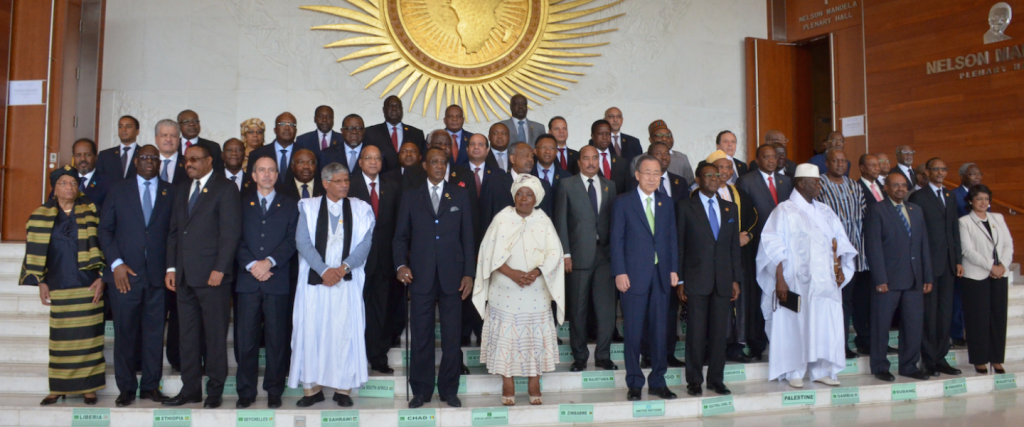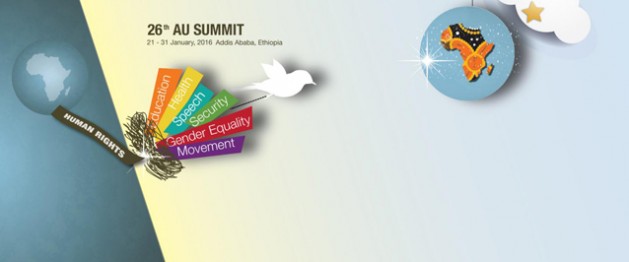Thirty States Ratify Establishment of African Court on Human and Peoples’ Rights
AFRICA, 15 Feb 2016
African Union – Human Wrongs Watch
Chad becomes 30th AU Member State to ratify the Protocol on the establishment of the African Court on Human and Peoples’ Rights.
5 Feb 2016 – The Republic of Chad has deposited its instrument of ratification of the Protocol to the African Charter on Human and Peoples’ Rights on the establishment of the African Court on Human and Peoples’ Right, bringing the number of African Union (AU) Member States to have ratified it to 30.
The instrument was signed on 27 January, 2016 by Chad’s President Idriss Deby Itno and immediately deposited at the AU Headquarters in Addis Ababa, Ethiopia.
The President of Chad assumed the AU annual rotating Chairmanship last week in Addis Ababa from President Robert Mugabe of Zimbabwe.
The other States which have ratified the Protocol are: Algeria, Benin, Burkina Faso, Burundi, Cameroon, Côte d’Ivoire, Comoros, Congo, Gabon and The Gambia.
Others are: Ghana; Kenya, Libya, Lesotho, Malawi, Mali, Mauritania, Mauritius, Mozambique, Nigeria, Niger, Uganda, Rwanda, Arab Saharawi Republic , Senegal, South Africa, Tanzania, Togo and Tunisia.
The African Court on Human and Peoples’ Rights is a continental court established by the AU to enhance the protection of human and peoples’ rights in Africa.
In addition to the ratification of the Protocol, States have to make a Declaration required under Article 34(6) of the Protocol to allow individuals and NGOs to bring cases directly before the Court.
Without such Declaration, the Court would have no jurisdiction over cases brought by individuals and NGOs.
So far, only seven states have made the Declaration. These are: Burkina Faso, Côte d’Ivore, Ghana, Malawi, Mali, Rwanda and Tanzania.
The Court was established by virtue of Article 1 of the Protocol to the African Charter on Human and Peoples’ Rights on the Establishment of an African Court on Human and Peoples’ Rights.
The Protocol was adopted on 9 June 1998 in Burkina Faso and came into force on 25 January 2004.The Court officially started its operations in November 2006.
The AU is made up of 54 Member States.
About the African Court on Human and Peoples’ Rights
The African Court on Human and Peoples’ Rights (the Court) is a continental court established by African countries to ensure protection of human and peoples’ rights in Africa. It complements and reinforces the functions of the African Commission on Human and Peoples’ Rights.
The Court was established by virtue of Article 1 of the Protocol to the African Charter on Human and Peoples’ Rights on the Establishment of an African Court on Human and Peoples’ Rights, (the Protocol) which was adopted by Member States of the then Organization of African Unity (OAU) in Ouagadougou, Burkina Faso, in June 1998. The Protocol came into force on 25 January 2004 after it was ratified by more than 15 countries.
As at November 2015, only seven (7) of the twenty nine (29) States Parties to the Protocol had made the declaration recognizing the competence of the Court to receive cases from NGOs and individuals.
The seven (7) states are; Burkina Faso, Cote d’Ivoire,Ghana, Mali, Malawi,Rwanda and Tanzania.
Only the following twenty nine (29) States have ratified the Protocol: Algeria, Benin, Burkina Faso, Burundi, Cameroon , Cote d’Ivoire, Comoros, Congo, Gabon, Gambia, Ghana, Kenya, Libya, Lesotho, Mali, Malawi, Mozambique, Mauritania, Mauritius, Nigeria, Niger, Rwanda, Sahrawi Arab Democratic Republic, South Africa, Senegal, Tanzania, Togo, Tunisia and Uganda.
Jurisdiction
The Court has jurisdiction over all cases and disputes submitted to it concerning the interpretation and application of the African Charter on Human and Peoples’ Rights, the (the Charter), the Protocol and any other relevant human rights instrument ratified by the States concerned. Specifically, the Court has two types of jurisdiction: contentious and advisory.
The Court is composed of eleven Judges, nationals of Member States of the African Union.
The first Judges of the Court were elected in January 2006, in Khartoum, Sudan.
They were sworn in before the Assembly of Heads of State and Government of the African Union on 2 July 2006, in Banjul, the Gambia.
The Judges of the Court are elected, after nomination by their respective States, in their individual capacities from among African jurists of proven integrity and of recognized practical, judicial or academic competence and experience in the field of human rights.
The judges are elected for a six year or four year term renewable once. The judges of the Court elect a President and Vice-President of the Court among themselves who serve a two year term.
They can be re-elected only once. The President of the Court resides and works on a full time basis at the seat of the Court, while the other ten (10) judges work on a part-time basis. In the accomplishment of his duties, the President is assisted by a Registrar who performs registry, managerial and administrative functions of the Court.
The Court officially started its operations in Addis Ababa, Ethiopia in November 2006, but in August 2007 it moved to its seat in Arusha, the United Republic of Tanzania, where the Government of the Republic has provided it with temporary premises pending the construction of a permanent structure.
According to the Protocol (Article 5) and the Rules (Rule 33), the Court may receive complaints and/or applications submitted to it either by the African Commission of Human and Peoples’ Rights or State parties to the Protocol or African Intergovernmental Organizations.
Non-Governmental Organizations
Non-Governmental Organizations with observer status before the African Commission on Human and Peoples’ Rights and individuals from States which have made a Declaration accepting the jurisdiction of the Court can also institute cases directly before the Court.
As of March 2014, only seven countries had made such a Declaration. Those countries are Burkina Faso, Ghana, Malawi, Mali, Rwanda, Tanzania and Republic of Cote d’Ivoire (Click on the name, to see the Country’s Declaration Text).
The Court delivered its first judgment in 2009 following an application dated 11 August 2008 by Mr Michelot Yogogombaye against the Republic of Senegal. As at September 2013, the Court has received 28 applications.
It has already finalized 23 cases. Currently the Court has 5 pending cases on its table to examine including Requests for advisory opinion.
Further information can be obtained from the Court’s website at www.african-court.org.
Go to Original – human-wrongs-watch.net
DISCLAIMER: The statements, views and opinions expressed in pieces republished here are solely those of the authors and do not necessarily represent those of TMS. In accordance with title 17 U.S.C. section 107, this material is distributed without profit to those who have expressed a prior interest in receiving the included information for research and educational purposes. TMS has no affiliation whatsoever with the originator of this article nor is TMS endorsed or sponsored by the originator. “GO TO ORIGINAL” links are provided as a convenience to our readers and allow for verification of authenticity. However, as originating pages are often updated by their originating host sites, the versions posted may not match the versions our readers view when clicking the “GO TO ORIGINAL” links. This site contains copyrighted material the use of which has not always been specifically authorized by the copyright owner. We are making such material available in our efforts to advance understanding of environmental, political, human rights, economic, democracy, scientific, and social justice issues, etc. We believe this constitutes a ‘fair use’ of any such copyrighted material as provided for in section 107 of the US Copyright Law. In accordance with Title 17 U.S.C. Section 107, the material on this site is distributed without profit to those who have expressed a prior interest in receiving the included information for research and educational purposes. For more information go to: http://www.law.cornell.edu/uscode/17/107.shtml. If you wish to use copyrighted material from this site for purposes of your own that go beyond ‘fair use’, you must obtain permission from the copyright owner.

